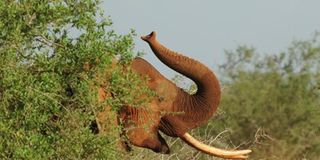We have moral obligation to keep our elephants safe

Elephants forage at the Tsavo-East National park. World Elephant Day will be celebrated on Saturday. AFP FILE PHOTO |
What you need to know:
In Africa, poachers can only be defeated by adopting a continent-wide approach.
Anti-poaching efforts will also have to be sustained on a timescale much longer than the election cycles in democratic countries.
African elephants are the largest terrestrial animal left on the planet.
As we celebrate World Elephant Day on Saturday, a life-sized ice sculpture of an African elephant is being placed in downtown Manhattan.
There it will gradually melt, symbolising the alarming rate at which African elephants are disappearing at the hands of poachers.
The event is part of the campaign #DontLetThemDisappear, launched by Amarula in partnership with WildlifeDirect, a Kenyan NGO.
To reinforce the message, bottles of the liqueur will be released for sale without the iconic elephant on the label.
Amarula will donate $1 for every bottle sold until the end of the year to support anti-poaching efforts.
Initiatives like this are vital to raise global awareness of the plight of Africa’s elephants. Across the continent, one elephant is killed by poachers every 15 minutes.
IVORY
The global demand for ivory is still the principal driving force pushing elephants to the brink of extinction. As expressed by First Lady Margaret Kenyatta, only a sustained global effort can save them.
“Elephants have lived in coexistence with human beings in Africa for millions of years,” said the First Lady. “They are part of our natural environment, our culture, our identity and our heritage. … We call on all citizens of the world to celebrate World Elephant Day by renewing their commitment to end trade in ivory. The only place that it belongs is on the elephant. Let’s play our part in keeping them alive.”
Saturday’s event at Union Square highlights the critical role that consuming countries have to play, both by reducing their own ivory consumption and by building pressure for a global ban on ivory trade.
In Africa, poachers can only be defeated by adopting a continent-wide approach.
Otherwise, when controls are tightened up in one country, poachers will simply continue their gruesome work in neighbouring countries.
POACHING
Anti-poaching efforts will also have to be sustained on a timescale much longer than the election cycles in democratic countries.
Elections are a reminder to defenders of wildlife of just how fragile our ‘victories’ can turn out to be.
In just a few weeks, Donald Trump has been able to dismantle environmental protection measures that took decades to put in place.
Here in Africa, all too often elections take place in a climate of uncertainty that allows unscrupulous people to plunder the natural environment, without fear of redress.
During the current election campaign, armed invaders have wreaked havoc in some parts of Laikipia, undoing years of patient wildlife conservation work. Not a single arrest has been made.
African elephants are the largest terrestrial animal left on the planet. It seems unthinkable that they should disappear. But how can we make sure it doesn’t happen?
NATURAL ENVIRONMENT
First, care for the natural environment should be understood as a moral duty, as it was by our ancestors for whom rivers, trees and animals were sacred. Desecrating them was a sin.
Our natural heritage should be protected at all costs; its importance transcends politics and differences among political parties.
Therefore, non-political organisations such as businesses and civil society organisations have a key role to play.
Second, this understanding should inform our vision of national development. People in developed countries are rich in many ways.
But visitors from developed countries who spend large amounts of money for a few moments in the company of elephants are searching for something that their societies, for all their material wealth, cannot provide.
Africa has the opportunity to map out a different path.
CREATING WEALTH
We can devise ways of creating wealth that leave our natural environment intact as a source of wonder and inspiration for future generations.
Support for this vision came last month from an unlikely quarter. Speaking in Nairobi, Jack Ma, the Chinese billionaire, argued passionately that Africa should not try to be like China.
Instead, he urged Kenya to develop its own model of development, using technology to protect our unique wildlife and the environment.
“Now I understand why so many people come to Africa every year,” he said: “It’s a business opportunity, so leverage that.”
This statement from one of the world’s most successful businessmen underlines what a terrible mistake it would be to allow development to destroy our natural heritage.
It also highlights that Africa’s has a unique role to play in solving global conservation challenges.
The collaboration between two African organisations, Amarula and WildlifeDirect, shows that we, as Africans, are taking responsibility for mobilising global support to meet the challenges of saving elephants and defeating the illegal wildlife trade.
Dr Kahumbu is the CEO of WildlifeDirect. [email protected]





